Alexander The Great’s Biblical Connection
David Tee - AncientPages.com - Throughout his life, it is very apparent that Alexander did not know what role he was fulfilling in history and biblical prophecy. His young life and military pursuits did not grant him a lot of time to become aware of the religious writings of other nations nor his role in history.
 Alexander the Great. source
Alexander the Great. source
During his childhood, it is unlikely that while he was training for future military and royal duties, his teacher Aristotle would add additional information to his already full educational life.
Alexander’s conquering of the untamed horse, Bucephalus can be seen as evidence where his training and talent lay. He would ride Bucephalus for the rest of his life.
Humbleness Was Not His Strong Suit
Given the right to rule and command at the age of 16, while his father was away invading Thrace, Alexander showed his military might with the defeat of the rebellious Maedi. With the capture of the Maedi stronghold, Alexander quickly renamed it after himself.
Alexander called it Alexandropolis or the city of Alexander. Later he would create a new Egyptian city and call it Alexandria. He certainly was not shy about using his own name to make sure he remained firmly tied to history and remembered for his exploits.
Upon the assassination of his father, Alexander assumed the throne and military leadership of Macedonia. This assumption of power was the next step in Alexander’s ties to the Bible.
Alexander And Israel
One of the first connections Alexander has to Israel is when he decided to take on the Persians in war. The Persians controlled the Levant, Egypt, and other neighboring nations and were seen as a threat to Macedonia’s existence.
Josephus (37 – 100 AD), a first-century Romano-Jewish historian, briefly records Alexander’s triumph in his Book 12 of the Antiquities of the Jews. He provides a very simple and concise statement concerning Alexander’s triumph over his and most other nation’s Persian enemy.
The book reads, “Now when Alexander, king of Macedon, had put an end to the dominion of the Persians and had settled the affairs of Judea.”
 Alexander the Great in the Temple of Jerusalem. source
Alexander the Great in the Temple of Jerusalem. source
Of course, Alexander’s victory enabled the Jewish people to learn the ancient Greek language which resulted in most ancient biblical manuscripts being written in ancient Greek.
This influence actually reached wherever Alexander established his Greek cities throughout his conquered territory. Greek became the language of both literature and commerce throughout his empire.
Alexander And Daniel
It may be that a lot of people may not know the connection the prophet Daniel has with Alexander the Great. Writing 250 years before the great general, Daniel received 4 prophecies from God concerning the actions and influence this future warrior would have on the world.
Daniel spoke of Alexander once in chapter 7 verse 6 of his Old Testament book, twice in chapter 8 verses 5 to 7 and one last time chapter 11, verse 4. In each Alexander was described as a leopard, a goat, a great horn, and a great king.
In each of the prophecies, Daniel also mentions that this great kingdom would be divided into four smaller empires, something that did happen to Alexander’s empire. The Ptolemy’s are the most famous branch of that division.
The prophecy was fulfilled when Alexander died an untimely death before he could see more fulfillment of his dreams.
Alexander, The Maccabees And Esther
The Book of Daniel was not the only mention of Alexander in Israeli literature. 1 Maccabees in its first chapter and first 7 verses provide an excellent but brief description of Alexander’s life and military accomplishments.
The passage also confirms what history has said about Alexander when he found out that there were no more nations to conquer. It says that he went to the ends of the earth and conquered many nations.
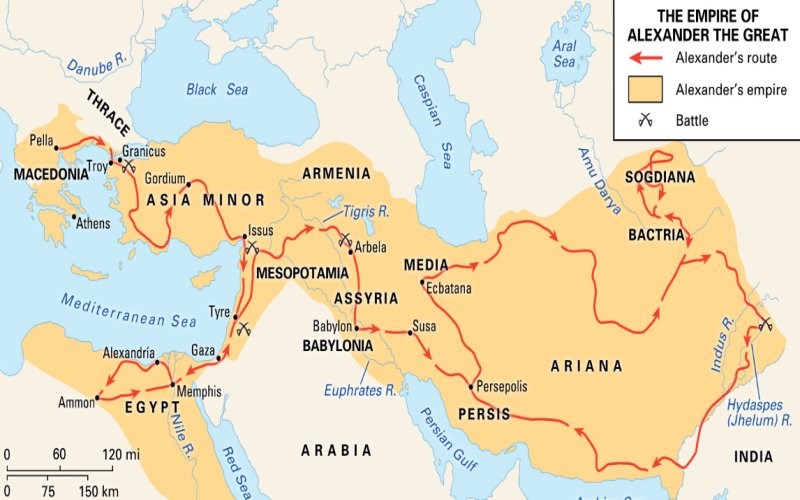 Alexander the Great's Empire. source
Alexander the Great's Empire. source
In Esther, there is not so much a mention of Alexander as there is a reference that may point to the Macedonians in general and their presence in Persia. In the Septuagint translation of the Old Testament, the Book of Esther refers to Haman as an Agagite, chapter 16, verses 10-14.
The word Agagite is thought by scholars to refer to the primitive Macedonians who had entered the different lands. It is debatable as to if the author of Esther was actually referring to a Macedonian or not, but the possibility is there.
Not so much as to the King himself, but to the Egyptian city, Alexander founded when he ruled physically in that country. Alexandria is mentioned three times in the book of Acts- 28:11; 18:24; & 27:6.
Also, the Greek people are mentioned numerous times throughout the Bible. Of the 14 times the Greeks are mentioned, only one is found in the Old Testament. That book is written by another prophet other than Daniel - Zechariah 9:13.
One New Testament mention has a Greek woman seeking relief from the demon who possessed her body.
After Alexander Died Many Problems Appeared
The inclusion in biblical prophecy and other books of the Bible did not protect Alexander's empire from trouble. After Alexander died, problems arose quickly. The Lamian War (323–322 BC took its toll on the empire as did the various murders of loyal Greek officers who served Alexander faithfully.
As predicted in the Bible, Alexander’s empire was eventually divided into four different parts each with its own ruler: Seleucus got Asia, Ptolemy received Egypt, Lysimachus took over Thrace, and Antipater's son Cassander was able to win both Macedonia and Greece.
Alexander’s empire was no more, although Macedonia would rise once again for a brief time when the Roman Empire split. The Macedonians ruled the Eastern Empire for roughly 200 years and their rule became known as the golden age of the empire.
Since that time, Alexander’s homeland never did maintain its former glory.
A majority of its land is held by both Greece and Bulgaria. Macedonia did gain a form of independence in 1991 but it had to be content with only about 37% of its former ancestral land.
Written by – David Tee AncientPages.com Staff Writer
Copyright © AncientPages.com All rights reserved. This material may not be published, broadcast, rewritten or redistributed in whole or part without the express written permission of AncientPages.com
Expand for referencesReferences:
Hartog, P. A. (2016). Macedonia
Josephus, F., & Whiston, The works of Josephus: complete and unabridged
International Standard Bible Encyclopedia, Vol. 1, page 331.
Alexander The Great Was Crowned Pharaoh And Declared Son Of God Amun
More From Ancient Pages
-
 Forgotten Ancient Empire That Extended Far Beyond America To Iceland And Its Mysterious Inscriptions
Ancient Mysteries | May 6, 2021
Forgotten Ancient Empire That Extended Far Beyond America To Iceland And Its Mysterious Inscriptions
Ancient Mysteries | May 6, 2021 -
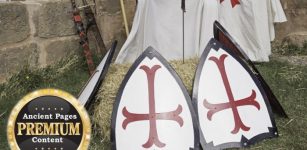 Strange Engraving Made By Knights Templar In French Village – It Doesn’t Make Sense Or Does It? – Part 2
Ancient Mysteries | Oct 9, 2019
Strange Engraving Made By Knights Templar In French Village – It Doesn’t Make Sense Or Does It? – Part 2
Ancient Mysteries | Oct 9, 2019 -
 Mystery Of The Horrible ‘Thing’ Found In A Dominican Monastery
Featured Stories | Sep 4, 2023
Mystery Of The Horrible ‘Thing’ Found In A Dominican Monastery
Featured Stories | Sep 4, 2023 -
 Viking Sword Unearthed In Grave Excavated by Archaeologists In Central Norway
Archaeology | Aug 27, 2020
Viking Sword Unearthed In Grave Excavated by Archaeologists In Central Norway
Archaeology | Aug 27, 2020 -
 Nottingham Scientists Investigate An Ancient Boat Buried Under A Pub Car Park
Archaeology | Feb 15, 2023
Nottingham Scientists Investigate An Ancient Boat Buried Under A Pub Car Park
Archaeology | Feb 15, 2023 -
 Mead: Secret Drink Of The Vikings And Gods – Was It An Ancient Antibiotic?
News | Feb 21, 2016
Mead: Secret Drink Of The Vikings And Gods – Was It An Ancient Antibiotic?
News | Feb 21, 2016 -
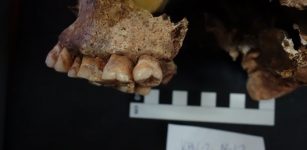 Milk Enabled Massive Steppe Migration
Archaeology | Sep 15, 2021
Milk Enabled Massive Steppe Migration
Archaeology | Sep 15, 2021 -
 How Did These Beautiful Venetian Glass Beads Reach North America Long Before Columbus?
Archaeology | Feb 15, 2021
How Did These Beautiful Venetian Glass Beads Reach North America Long Before Columbus?
Archaeology | Feb 15, 2021 -
 Gigantic Asipatra: Terrifying Mythical Monster Bird In Hindu Beliefs
Featured Stories | Jun 14, 2017
Gigantic Asipatra: Terrifying Mythical Monster Bird In Hindu Beliefs
Featured Stories | Jun 14, 2017 -
 Roman-Byzantine Grave Unearthed In Turkey
Archaeology | Jan 28, 2016
Roman-Byzantine Grave Unearthed In Turkey
Archaeology | Jan 28, 2016 -
 Famous Viking Sigurd Snake-In-The-Eye, Son Of Ragnar Lodbrok And The Mark Of Fafnir Prophecy
Featured Stories | Mar 16, 2018
Famous Viking Sigurd Snake-In-The-Eye, Son Of Ragnar Lodbrok And The Mark Of Fafnir Prophecy
Featured Stories | Mar 16, 2018 -
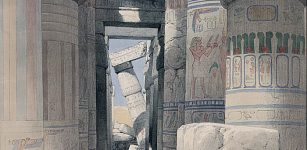 Karnak: One Of Largest Temple Complexes In The World And Its Spectacular View
Civilizations | Sep 5, 2015
Karnak: One Of Largest Temple Complexes In The World And Its Spectacular View
Civilizations | Sep 5, 2015 -
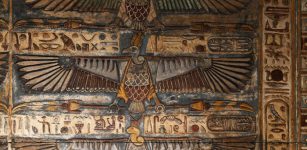 Never-Before-Seen Colorful Inscriptions And Reliefs At The Esna Temple, Egypt Revealed After Restoration
Archaeology | May 16, 2022
Never-Before-Seen Colorful Inscriptions And Reliefs At The Esna Temple, Egypt Revealed After Restoration
Archaeology | May 16, 2022 -
 Mystery Of Biblical Adam – A Hidden Story Within A Story Open To Interpretation
Ancient Mysteries | Jan 18, 2018
Mystery Of Biblical Adam – A Hidden Story Within A Story Open To Interpretation
Ancient Mysteries | Jan 18, 2018 -
 Long-Lost Ancient Tomb Of ‘China’s Shakespeare’ Finally Found
Archaeology | Aug 31, 2017
Long-Lost Ancient Tomb Of ‘China’s Shakespeare’ Finally Found
Archaeology | Aug 31, 2017 -
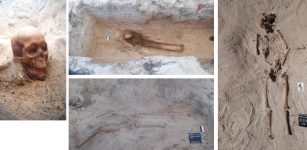 Silent Witnesses: Further Dark Secrets Of Batavia Shipwreck – Uncovered
Archaeology | May 11, 2023
Silent Witnesses: Further Dark Secrets Of Batavia Shipwreck – Uncovered
Archaeology | May 11, 2023 -
 New Paintings And Details Uncovered In The Egyptian Temple Of Esna
Places | Oct 22, 2024
New Paintings And Details Uncovered In The Egyptian Temple Of Esna
Places | Oct 22, 2024 -
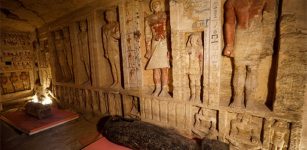 Collection Of 59 Well-Preserved 26th Dynasty Coffins Unearthed In Saqqara Necropolis, Egypt
Archaeology | Oct 4, 2020
Collection Of 59 Well-Preserved 26th Dynasty Coffins Unearthed In Saqqara Necropolis, Egypt
Archaeology | Oct 4, 2020 -
 100,000-Year-Old Case Of Deafness Discovered In Fossilized Skull Of Hunter-Gatherer
Archaeology | Jul 21, 2022
100,000-Year-Old Case Of Deafness Discovered In Fossilized Skull Of Hunter-Gatherer
Archaeology | Jul 21, 2022 -
 Riddle How Human’s Uniquely DNA Evolved Solved By Scientists
DNA | Jan 13, 2023
Riddle How Human’s Uniquely DNA Evolved Solved By Scientists
DNA | Jan 13, 2023
